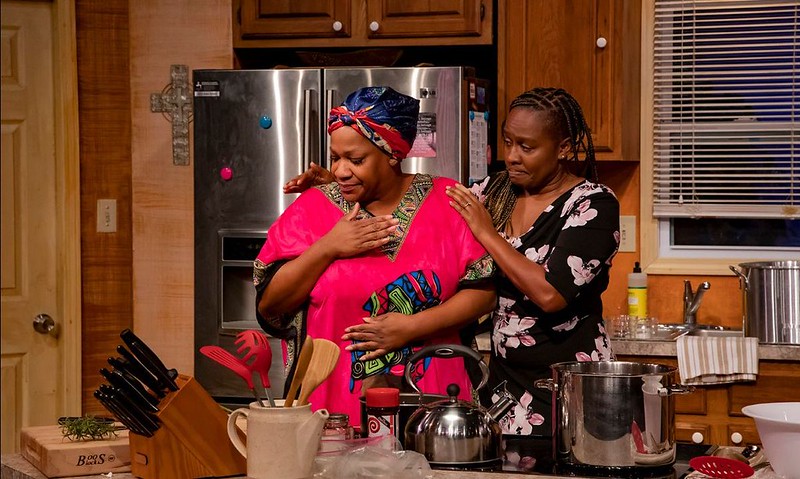
According to Nathan Motta, Dobama’s artistic director, the recipe for a great play is well-developed characters, circumstances that incite reaction, environments are ripe for action/reaction, strong dialogue and balanced elements.
Motto believes that Stew, a 2021 Pulitzer Prize finalist, which is now on stage at Dobama, Cleveland’s off-Broadway theater, is a “fantastic play that has all the fixings for a great feast.” He explains his reasoning: “As we act as a fly on the wall, we get to know these women [the five members of the African American Tucker family] who tease, prod, instruct and question each other, we experience their family dynamics and watch as closely guarded secrets are brought to light.”
What’s it all about? “The Tucker women are up early to prepare an important meal, or at least that’s what Mama says. As the day wears on, tensions simmer inside and around Mama’s kitchen.” Tensions which include teen pregnancy, potential abortion, marriage infidelity, divorce, random gunfire, spats over recipes, family traditions and are summarized by Mama’s mantra, ‘Shit. Damn! Fuck.’”
Motta is not alone in his positive beliefs about the play. Reviewers from other productions of this script have commented, “A powerful play about a family with all its foibles and love.” “If it was a TV show you would want season 2 to get picked up pronto!” “Is an excellent script that shares the pure truth of how each individual’s life struggle can affect the family structure.”
What is the meaning of title? “This play is indeed a stew, the actors & plotlines mimicking the layering that the family matriarch sees as essential to her delicious culinary creation. The metaphors for motherhood, daughterhood, family and love are meaningful. Each woman contributes a different taste or element to the familial stew and each brings it to a boil at some point.”
The Dobama production, 90 minutes with no intermission, is compelling. The staging is guided by creative director/composer Nina Domingue, a Black woman, cultural memory worker and intimacy advocate, who banners herself as a griot (“a West African historian, storyteller, praise singer, poet, and/or musician.”)
The cast, headed by Christina Johnson (Mama), who is holding on to life by a thread. She is spot-on in her character development as the matriarch whose family teeters on the edge of destruction. How do you guide a group of headstrong females who seem to act on pure emotion and no logic? “Whenever Mama takes a brief moment away from her cooking and does not personally tend to the pot, the stew gets burnt or ruined in some way, much to her frequent upset. And then she has to turn around and start another batch.”
Nicole Sumlin (Lillian, the oldest daughter), who appears at the opening of the play to be living a functional life, unravels as she shares that her marriage is over and she did not come to Mamma’s with her two children to visit, but to return to in order to survive. Hers is well-nuanced performance.
Adrionna Powell (Nelly, Lillian’s sister) presents a conflicted teenager who wants to be independent, treated as an adult, but who is now pregnant and facing life with the consequences of deciding whether to abort the child or be a teen mother. Powell nicely develops the character.
Logan Door Williams (Lil’ Mamma, Lillian’s tween daughter), the youngest of the Tucker females, finds herself caught in the midst of on-going family angst. This youngster nicely develops her role.
Laura Carlson-Tarantowski’s realistic and functional kitchen set design enhances the production. Megan Culley’s well-presented sound effects are one of the play’s developmental fulcrums.
CAPSULE JUDGMENT: A must-see production that lives and breathes with an undeniable passion and earnestness. The ending of the play is both shocking and unexpected. Don’t be surprised if the effect lingers in your mind as the full impact hits.
Stew runs through February 19 at Dobama Theatre. For tickets go to dobama.org/tickets-index.
Next up at Dobama: The Other Place, March 10-April 2. Juliana is 52 years old and a brilliant drug-company scientist. She is giving a speech to a neurological convention. As she speaks we cut away to scenes with her doctor, phone calls from her estranged daughter, and arguments with her husband who may or may not be divorcing her. Through it all she constantly refers to “the other place,” a cottage on Cape Cod that the family once owned, and a place where Juliana feels she may reunite with her missing daughter and find some peace of mind.